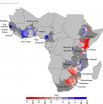(Press-News.org) It's human nature to hate losing.
Unfortunately, it's also human nature to overreact to a loss, potentially abandoning a solid strategy and thus increasing your chances of losing the next time around.
That's one conclusion of a Brigham Young University study published this week by the journal Management Science. The finding is based on an analysis of two decades of data on NBA coaching decisions.
The researchers focused on whether coaches adjusted their personnel following games where the margin of victory or defeat was small. After narrow wins, coaches changed their starting lineup one-fourth of the time. But after narrow losses, they changed their starting lineup one-third of the time.
"A blowout win is informative about the team's future success, compared to a crushing defeat," said Brennan Platt, a professor of economics at BYU and co-author on the study. "But losing by a point versus winning by a point, most of that is just noise. To say 'a win is a win' ignores important information in the intensity of the win, causing narrow losers to overreact and narrow winners to be complacent."
Platt and fellow BYU economists Lars Lefgren and Joe Price modeled the result of these attempts to right the ship. They found that hasty adjustments actually backfire, resulting in about one extra loss per season per team.
None of the coaches in the sample demonstrated immunity to overreacting to close losses. The study authors note that coaches also underreact to close wins – particularly games that were expected to win by large margins. That's why they titled their study "Sticking with What Barely Worked."
Platt said the findings are particularly relevant to bosses' evaluations of employee performance.
"A lot of the goals businesses set are related to zero/one outcomes – did you meet your sales quota, did the patient recover, did the plane arrive on time," Platt said. "You need to be careful to process all of the information. Things that are out of your control should be accounted for before you start evaluating staff. The intensity of the outcome – by how far they missed the goal – should give you an indication of whether it was just bad luck."
INFORMATION: END
'Moral victories' might spare you from losing again
2014-07-21
ELSE PRESS RELEASES FROM THIS DATE:
Water, water -- not everywhere: Mapping water trends for African maize
2014-07-21
Today's food production relies heavily on irrigation, but across sub-Saharan Africa only 4 percent of cultivated land is irrigated, compared with a global average of 18 percent. Small-scale farming is the main livelihood for many people in the region, who depend on rainfall to water their crops.
To understand how climate change may affect the availability of water for agriculture, researchers at Princeton University analyzed trends in the water cycle in maize-growing areas of 21 African countries between 1979 and 2010. The team examined both levels of rainfall and the ...
Global warming 'pause' since 1998 reflects natural fluctuation
2014-07-21
Statistical analysis of average global temperatures between 1998 and 2013 shows that the slowdown in global warming during this period is consistent with natural variations in temperature, according to research by McGill University physics professor Shaun Lovejoy.
In a paper published this month in Geophysical Research Letters, Lovejoy concludes that a natural cooling fluctuation during this period largely masked the warming effects of a continued increase in man-made emissions of carbon dioxide and other greenhouse gases.
The new study applies a statistical methodology ...
Mammoth and mastodon behavior was less roam, more stay at home
2014-07-21
Their scruffy beards weren't ironic, but there are reasons mammoths and mastodons could have been the hipsters of the Ice Age.
According to research from the University of Cincinnati, the famously fuzzy relatives of elephants liked living in Greater Cincinnati long before it was trendy – at the end of the last ice age. A study led by Brooke Crowley, an assistant professor of geology and anthropology, shows the ancient proboscideans enjoyed the area so much they likely were year-round residents and not nomadic migrants as previously thought.
They even had their own ...
NIH-supported scientists demonstrate very early formation of SIV reservoir
2014-07-21
WHAT:
Scientists have generally believed that HIV and its monkey equivalent, SIV, gain a permanent foothold in the body very early after infection, making it difficult to completely eliminate the virus even after antiretroviral therapy has controlled it. Now NIH-supported researchers report that SIV can become entrenched in tissues fewer than 3 days after infection, before the virus is detectable in blood plasma (the liquid part) or blood cells.
Led by Dan H. Barouch, M.D., Ph.D., of Beth Israel Deaconess Medical Center and the Ragon Institute, in collaboration with ...
National survey from AP-NORC examines perceptions of health care provider quality
2014-07-21
Chicago, July 20, 2014—The Associated Press-NORC Center for Public Affairs Research has released the results of a major survey examining the public's opinions about what it means to be a quality health care provider in the United States. The survey, funded by the Robert Wood Johnson Foundation, sheds new light on how American adults perceive the quality of their health care and doctors, as well as the information they use and trust when making health care decisions. The survey produces new and actionable data during a crucial period of Affordable Care Act (ACA) implementation. ...
Try, try again? Study says no
2014-07-21
CAMBRIDGE, MA -- When it comes to learning languages, adults and children have different strengths. Adults excel at absorbing the vocabulary needed to navigate a grocery store or order food in a restaurant, but children have an uncanny ability to pick up on subtle nuances of language that often elude adults. Within months of living in a foreign country, a young child may speak a second language like a native speaker.
Brain structure plays an important role in this "sensitive period" for learning language, which is believed to end around adolescence. The young brain is ...
Fires and Smoke in Canada's Northern Territories
2014-07-21
Environment Canada has issued a high health risk warning for Yellowknife and surrounding area because of heavy smoke in the region due to forest fires. Currently 160 wildfires are burning across the region. There are no plans for evacuation since these fires are endangering people or property. Weather that has been hitting the area recently comes with mixed results. The rains help to dampen the fires, but the lightning tends to start others.
This year the Northern Territories have seen 855,000 hectares (over 2,100,000 acres) burned as opposed to the territories 10 ...
Researchers provide guide to household water conservation
2014-07-21
BLOOMINGTON, Ind. -- Want to conserve water and save on your utility bill? A paper co-written by an Indiana University researcher and published in the current issue of the journal Environment can help.
"The Water Short List: The Most Effective Actions U.S. Households Can Take to Curb Water Use" describes how households can reduce water use substantially by simple actions such as installing more efficient appliances and changing day-to-day habits involving water consumption. While the suggestions may be familiar, the researchers are the first to put a comprehensive, quantitative ...
Penn study: Understanding graphene's electrical properties on an atomic level
2014-07-21
Graphene, a material that consists of a lattice of carbon atoms, one atom thick, is widely touted as being the most electrically conductive material ever studied. However, not all graphene is the same. With so few atoms comprising the entirety of the material, the arrangement of each one has an impact on its overall function.
Now, for the first time, researchers from the University of Pennsylvania have used a cutting-edge microscope to study the relationship between the atomic geometry of a ribbon of graphene and its electrical properties.
A deeper understanding of ...
Louisiana Tech University professor presents at International Bioprinting Congress
2014-07-21
RUSTON, La. – Dr. Mark DeCoster, the James E. Wyche III Endowed Professor in Biomedical Engineering at Louisiana Tech University, will present as an invited speaker at the International Bioprinting Congress, July 24-25 at the Biopolis Research and Development Center in Singapore.
DeCoster, who is also a research faculty member in Louisiana Tech's Institute for Micromanufacturing, will present a lecture titled, "Bioprinting interfaces for 2D and 3D cell and tissue models." The presentation will focus on the development of a novel, matrix-free method for generating 3D ...




